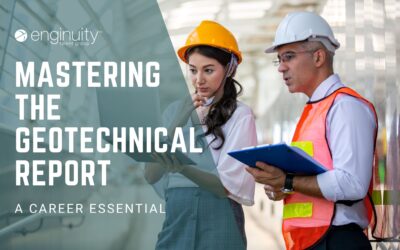Geotechnical engineering plays a pivotal role in the planning and execution of infrastructure projects, requiring a deep understanding of soil, rock, and their interactions with engineered structures. As the complexity of construction projects increases and environmental considerations become more critical, enhancing expertise in geotechnical engineering can set professionals apart in the industry. This article explores effective strategies for geotechnical engineers aiming to advance their skills beyond the basics.
Advanced Education and Specializations
To deepen your knowledge and set yourself apart in the geotechnical field, consider the following educational pathways:
- Advanced Degrees: Pursuing a Master’s or Ph.D. in geotechnical engineering can significantly enhance your understanding and open up opportunities in research, academia, and specialized industry roles. These programs often focus on critical issues such as seismic analysis, soil behavior under extreme conditions, and innovative foundation solutions.
- Targeted Specializations: Specializing in niche areas within geotechnical engineering, such as earthquake engineering, environmental geotechnics, or urban geotechnics, can position you as an expert in areas with specific challenges and high demand for specialized skills.
Professional Development and Certifications
Continual learning is key to staying relevant and proficient in the ever-evolving field of geotechnical engineering:
- Certifications: Acquiring professional certifications related to geotechnical engineering can demonstrate your expertise and commitment to the field. Certifications from recognized professional bodies can include credentials in soil and rock testing, foundation design, and slope stability analysis.
- Conferences and Workshops: Regularly attending industry conferences, seminars, and workshops not only keeps you updated on the latest trends and technologies but also provides networking opportunities with other professionals and thought leaders in the field.
Technological Proficiency
In an era where technology significantly influences engineering practices, staying updated with the latest tools is essential:
- Software Skills: Mastery of industry-standard software such as AutoCAD Civil 3D, PLAXIS, and GeoStudio is crucial for performing detailed analysis and design tasks in geotechnical engineering. These tools are indispensable for simulating complex geotechnical problems and solutions.
- Emerging Technologies: Familiarize yourself with the latest advancements in technology that impact geotechnical engineering, such as the use of artificial intelligence for predicting soil behavior and the application of geographic information systems (GIS) for terrain analysis.
Research and Innovation
Engaging in research can not only enhance your knowledge but also contribute significantly to the advancement of the field:
- Publishing Research: Conduct and publish original research on current challenges in geotechnical engineering. This enhances your reputation as an expert and contributes to the broader knowledge base.
- Participation in Pioneering Projects: Look for opportunities to participate in groundbreaking projects that push the boundaries of traditional geotechnical solutions, such as sustainable urban development projects or offshore engineering.
Networking and Mentorship
Building a strong professional network and engaging in mentorship are invaluable for career growth:
- Professional Associations: Active participation in professional bodies such as the American Society of Civil Engineers (ASCE) can provide access to specialized resources and community engagement.
- Mentorship Roles: Serving as a mentor or seeking mentorship within these associations can help in gaining new insights and strengthening professional relationships.
Leveraging Resources for Career Advancement
For geotechnical engineers looking to advance their careers, actively seeking new learning opportunities and staying abreast of industry developments are crucial. Partnering with organizations like Enginuity Advantage can also facilitate career growth by connecting professionals with tailored opportunities in the engineering sector, aligning advanced skills with innovative projects and leading companies. This strategic approach can significantly enhance your professional journey in geotechnical engineering.


0 Comments